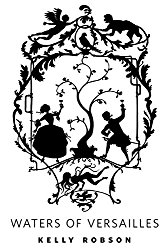By Carl Slaughter: Kelly Robson’s fantasy alternate history short story, “Waters of Versailles,” edited by Ellen Datlow and published by Tor, was nominated for a Nebula Award, World Fantasy Award, and Aurora Award. In this interview, she shares insight into the story’s appeal.
CARL SLAUGHTER: Who is the main character in ”Waters of Versailles,” what makes him tick, and what is he trying to accomplish?
KELLY ROBSON: Sylvain de Guilherand is a womanizer and social climber working his way up the social ladder at the Palace of Versailles in 1738. Sylvain is from a noble family in the southern Alps. He’s always been a man of action — a hunter at home and an officer in the French army — so the enforced elegant idleness of Versailles is maddening to him. He’s pursuing wealth and influence by upgrading the palace’s failing water systems and offering the nobility the latest status symbol — the flush toilet.
CS: Who is the fantasy character, how does she enter the story, and what part does she play in the plot?
KR: Sylvain’s water system is powered by an incredibly powerful young nixie. Sylvain caught her in a glacier lake when she was just a tadpole, brought her to the palace, and installed her in an underground cistern. Now she’s the size of a six-year-old child, and has an irrepressibly playful and mischievous personality to match.
CS: What kind of dynamic do these 2 characters have?
KR: Sylvain has been relying on an elderly manservant to take care of the nixie, and he’s been rather snotty about it because doesn’t regard taking care of children as a proper use of a man’s time. The nixie, on the other had, thinks of Sylvain as her father. This is a recipe for trouble, because Sylvain has no idea how to care for a magical child and no particular desire to do so, and the nixie is easily bored. She’s perfectly capable of springing leaks all around the palace for fun.
CS: How does the main character evolve — or does he? — and what is the catalyst for that evolution?
KR: To save his reputation, Sylvain has to negotiate his relationship with the nixie. He has to nurture her, entertain her, and teach her — in essence, he becomes her parent. And parenthood comes with an emotional bond that Sylvain certainly wasn’t expecting.
CS: Same question for the fantasy character?
KR: The nixie is a sweet, good-hearted child, but like all children she craves attention and entertainment. She’s wants to please Sylvain — she’s imprinted on him — but doesn’t like being ignored. She’s demanding. She needs much more attention than Sylvain’s willing to give her, and she’s growing more powerful every day.
CS: How do the various other characters make things complicated for these 2 characters?
KR: I’ve always been interested in characters who have it all but find out how little it does for them. Sylvain has it all: a beautiful and charming lover, a steadfast best friend, a position of power and influence in the richest nation in the world, the admiration of the king and court, and the loyalty of an extremely powerful magical creature. Where it starts to go wrong for Sylvain is when he tries to be all things to all people — a man with no limits.
CS: What do we take away from this story?
KR: First, that the act of taking nurturing creates love, and love changes you. And second, that trying to be please everyone is a recipe for disaster. In the end, it’s only the people you love who matter.
CS: First the Nebula, then the World Fantasy, now the Aurora. Meanwhile, inclusion in Jonathan Strahan’s Best Science Fiction and Fantasy of the Year. What’s the appeal of this story?
KR: I think the story hits the mark with a lot of people simply because it’s about love. Not romantic love, but the simple uncomplicated bond between a parent and a child — which is universal.
Read Carl’s profile of Kelly at SF Signal.
Discover more from File 770
Subscribe to get the latest posts to your email.



I really, really liked this story (it was on my Hugo nomination ballot). The main character starts out a stupid, self-absorbed, self-destructive jerk — and in the course of the story, starts to grow up and realize the difference between real friends and users.
I read several stories last year which frustrated me immensely because the protagonist, by the end of the book, had not gained wisdom or “grown the hell up” at all. This story was so refreshing in its portrayal of a flawed character who was able to learn and grow in the course of the narrative. (And the little dose of schadenfreude at the end was a bonus.)
Read the novella for free here.
I was a big fan as well, and “Waters of Versailles” was on my ballot.
Fellow enthusiasts might be interested in a recent episode of The Coode Street Podcast hosting Robson. (I know I’m interested in it, I just haven’t quite reached it yet!)
2nding JJ. This was on my Hugo nominations list, too. The lead started off a jerk and was much less so by the end. I also liked mythical creatures as plumbing systems, it does explain a lot in high rise buildings. The story feels kind of light in tone but then left me moved by the end.
Not sure it matters, but I didn’t register this as by a female author. Clearly I need to work on my virtue signalling.
Thirding JJ; this was on my nominating ballot too. In addition to being a terrific story, I thought it was a rare example of nuts & bolts Fantasy (nuts & bolts SF is comparatively common).
I didn’t like it (and I haven’t been quiet about not liking it) but I didn’t get that the nixie was supposed to be a six-year-old, so I think this one is on me. I thought she was supposed to be more like 16 and this was supposed to be a romantic relationship, which was… Is “squicky” a word? But that’s my fault. I probably read too quickly or missed some important bit of info, so again, it’s on me that I got the wrong impression. (And I am THRILLED to hear more about the story so I know why other people liked it and I didn’t, because that was kind of driving me crazy. Like, what was I missing? Well, now I know! THANK YOU!)
@BigelowT: I am curious, now that you know the nixie is six, do you feel inclined to go back and reread it to see if your judgement of it changes?
Nancy Sauer:
Hmm… I don’t know. I’ll have to think about that. I’m in the middle of something else really different (Neil Gaiman’s NEVERWHERE which I somehow have never read before) and my head is there, so I will have to see where I’m at when I finish it.
This was on my ballot too. What a good story. It didn’t hit you over the head with the moral, but there it is: family vs. status-climbing.
godstalk
Been trying to work out who the picture of Kelly reminded of and finally realised it was Franka Potente (from Run Lola, Run and the Bourne Identity)